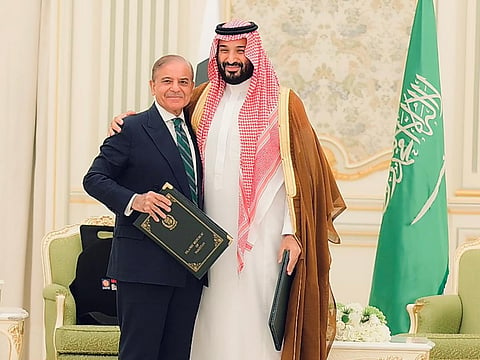Explained: Pakistan and Saudi Arabia’s watershed defence pact
Historic security agreement between countries pledges joint response to any aggression

Dubai: Saudi Crown Prince and Prime Minister Mohammed bin Salman and Pakistan’s Prime Minister Shehbaz Sharif on Wednesday signed a Strategic Mutual Defence Agreement in Riyadh, pledging that any attack on either country will be treated as an act of aggression against both.
The agreement was formalised at al-Yamamah Palace during Sharif’s state visit to the Kingdom, undertaken at the invitation of the Saudi crown prince. According to a joint statement issued by the Pakistan Foreign Office, the pact seeks to “develop aspects of defence cooperation between the two countries and strengthen joint deterrence against any aggression”, while aiming to enhance security and help achieve peace in the region and the world.
The Strategic Mutual Defence Agreement is widely seen as a watershed in Pakistan—Saudi relations, signalling that the two traditional allies are elevating their ties from friendship to formal defence partnership, with implications extending across South Asia and the Gulf.
Historic pact
Officials said the agreement builds on nearly eight decades of close partnership between the two nations, rooted in shared Islamic heritage, strategic interests, and long-standing defence cooperation. Over the years, Riyadh has been a key provider of financial assistance, energy supplies, and security coordination for Islamabad, while Pakistani military personnel have frequently served in training and advisory roles within the Kingdom.
Both leaders described the pact as a natural extension of their historic relationship. The joint statement called it a reflection of their “shared commitment to enhance security” and a symbol of the “bonds of brotherhood and Islamic solidarity” that underpin bilateral ties.
Warm reception
Sharif, who was received with full state honours, was welcomed at the airport by Riyadh’s Deputy Governor Prince Muhammad bin Abdulrahman bin Abdulaziz. As his plane entered Saudi airspace, Saudi Air Force jets escorted the aircraft in a gesture described by Pakistan’s state media as “a sign of brotherly respect.”
At the official talks inside al-Yamamah Palace, both sides were represented by high-level civil and military delegations. The discussions covered bilateral relations, defence and security cooperation, trade and investment prospects, and regional and international developments.
Also Read: Saudi Arabia, UAE invest $26m in Pakistan
Strategic significance of Sharif’s visit
Sharif’s visit holds wide strategic implications:
While Pakistan and Saudi Arabia have long cooperated informally on security matters, this agreement codifies their mutual defence obligations for the first time in writing.
The pact marks a shift from transactional ties to a more structured security alliance, signalling a deeper Saudi trust in Pakistan as a defence partner amid shifting regional dynamics.
Coming at a time of heightened instability in the Middle East, the agreement shows both countries are seeking to diversify security partnerships beyond traditional allies.
The signing enhances Islamabad’s profile as a reliable security partner in the Islamic world, potentially unlocking new cooperation on defence technology, energy, and trade.
Looking ahead
While the agreement does not explicitly mention nuclear cooperation, Pakistan’s status as a nuclear-armed state gives the pact symbolic weight as a deterrent, particularly in a region facing rising tensions. Observers note that its operational details such as joint exercises, command coordination, and response protocols are yet to be revealed.
Nevertheless, the Strategic Mutual Defence Agreement is widely seen as a watershed in Pakistan—Saudi relations, signalling that the two traditional allies are elevating their ties from friendship to formal defence partnership, with implications extending across South Asia and the Gulf.
Why this defence pact matters
Formalises a long-standing security relationship
Pakistan and Saudi Arabia have cooperated on defence for decades, but this is their first written mutual defence pact, making their partnership legally binding and more predictable.
A joint deterrence shield
By declaring that an attack on one will be treated as an attack on both, the pact aims to deter potential aggressors and raise the cost of hostile actions against either country.
Strengthens regional security posture
The agreement comes amid rising tensions in the Middle East. It signals a new security alignment and shows both states are willing to diversify alliances beyond traditional Western security guarantees.
Boosts Pakistan’s strategic standing
Ties Pakistan directly to Gulf security, giving Islamabad greater influence in regional decision-making and possibly enhancing its leverage for economic and energy cooperation.
Expands Saudi Arabia’s Defence options
For Riyadh, partnering with a nuclear-armed military power adds weight to its defence posture and complements its push to build a self-reliant and multilayered security framework.
Sign up for the Daily Briefing
Get the latest news and updates straight to your inbox




